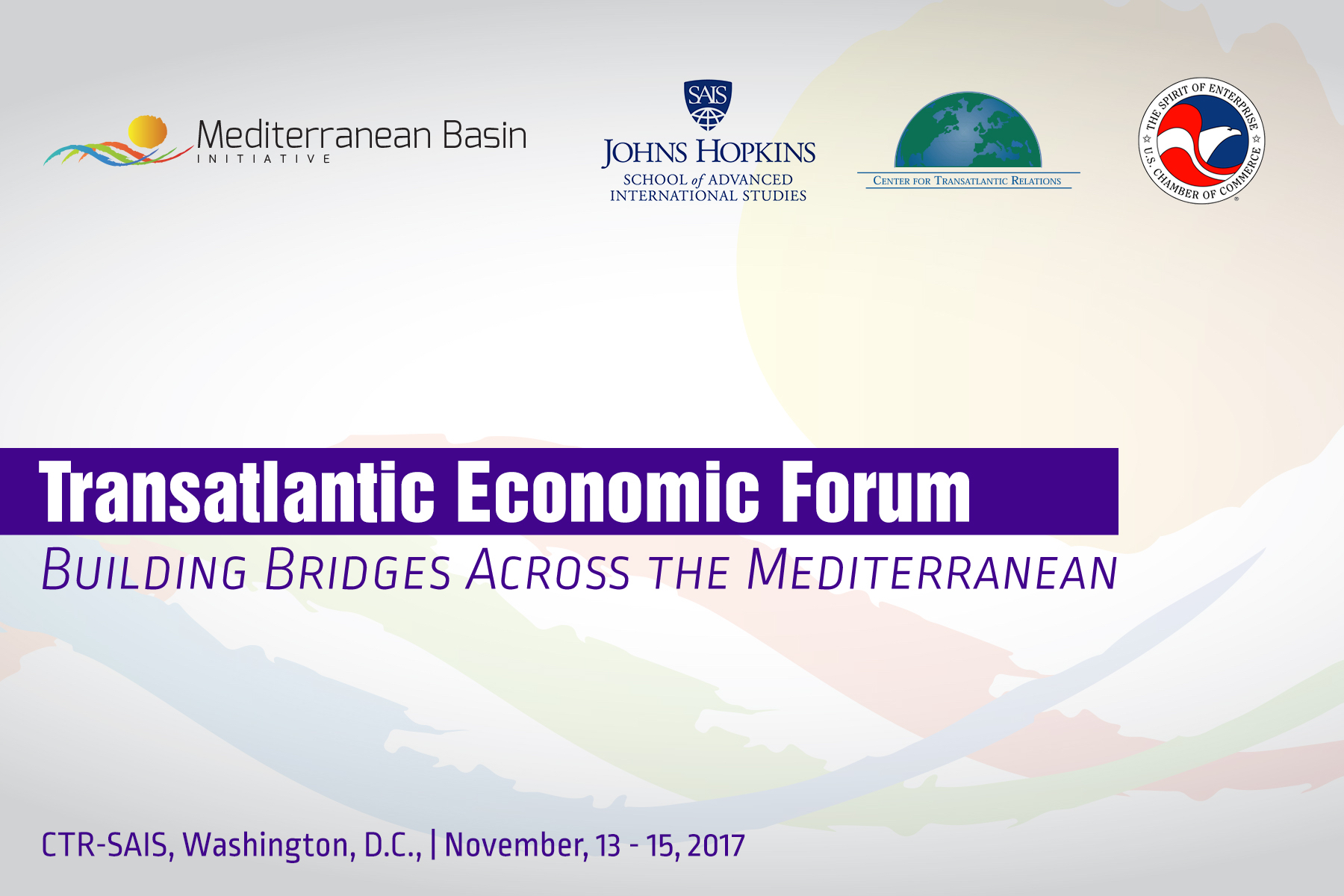
András Simonyi and Tea Ivanovic
On November 13-15, the Center for Transatlantic Relations-SAIS, in partnership with the U.S. Chamber of Commerce, is hosting the 5th annual Transatlantic Economic Forum in Washington D.C. The purpose of the three-day conference is to strengthen transatlantic cooperation, with a particular regional focus on the wider Mediterranean, the Western Balkans, MENA, and the Gulf countries.
This year, emphasis is placed on security and energy with a breadth of government officials and private sector representatives – from 14 countries – participating.
The Mediterranean is amidst a security crisis, combatting illegal migration flows, strengthening border security cooperation, and furthering measures to defeat ISIS and other extremist groups. These issues will be discussed with military and foreign policy experts from several countries of the Mediterranean, to include a keynote address by the honorable Richard V. Spencer, U.S. Secretary of the Navy.
Issues such as answering how to boost business cooperation with the U.S. and support economic diversification to reduce dependency on oil and gas in the Middle East, addressing needed economic and social reforms in the Western Balkans on their path to EU membership, and addressing political uncertainties and popular discontent in the Maghreb require robust regional and transatlantic cooperation.
The role of the media represents an important issue at this year’s Forum. Amanda Bennett, Director of Voice of America and Pulitzer-prize winning author, will also conduct a keynote address, and several regional media outlets will participate at the Forum’s panels.
In support of Macedonia’s new government led by Prime Minister Zoran Zaev, determined to speed up Euro-Atlantic integrations, Kocho Angjushev, Macedonia’s Deputy Prime Minister, will lead the Macedonian delegation, with an entire panel dedicated to progress in this country.
Marinko Cavara, President of the Federation of Bosnia and Herzegovina will discuss issues on the needed electoral reforms in this country.
Omar Bahlaiwa, Member of the Board of Committee for International trade (CIT), anticipates close relations with the U.S. He called Donald Trump’s May visit “historical,” and “[likely to shift] bilateral trade to a new level in the near future, which in turn, will enable the U.S. to gain back its position as the number one partner in export/import with Saudi Arabia.”
The United Arab Emirates are on an aggressive path towards an economic diversification away from oil, and the upcoming “Expo 2020 Dubai,” is expected to bring roughly 25 million visitors to Dubai in three years.
Bilal Sabouni, CEO of the U.S. Chamber of Commerce’s affiliate office – the American Business Council in Dubai, the United Arab Emirates (U.A.E.), notes that while a likely hurdle for the economy will be the added taxes, such as the Excise Tax (implemented last month) and the Value Added Tax (VAT), expected to be announced on January 1st, government incentives are likely to offset these burdens. “There does not seem to be any indication that the country will be introducing corporate or personal income taxes anytime soon, which will be a relief for businesses and residents as Dubai and Abu Dhabi have both gone up in the rankings for the most expensive cities to live in 2017,” Sabouni says.
Omar Mohanna, Chairman of the Suez Cement Group of Companies and Chairman of the Egypt-U.S. Business Council (EUSBC) stresses the importance of establishing a Free Trade Agreement (FTA) between the U.S. and Egypt. “From an economic standpoint, agreements such as the TIFA and the QIZ have been very beneficial for Egyptian and American businesses, but the ultimate objective remains a FTA with the United States.”
Ali Haddad, President of the Algerian Business Leaders Forum (FCE) warns for public sector limitations on investment – calling for the management of industrial zones to be in the hands of the private sector, stressing that private businesses create two out of three jobs in the Algerian economy. “At FCE, we have made several proposals related to the fight against unemployment, the regulatory framework governing labor relations as well as training, whether academic or professional, which must be adapted to the evolution of Algerian companies,” Haddad says.
At the Forum, three books, Algeria and Transatlantic Relations, Turkey and Transatlantic Relations, and Vision 2020: Bosnia and Herzegovina Towards its European Future will be launched.
The Center for Transatlantic Relations awards the prestigious “Mediterranean Leadership Award” to a small number of government, private sector and NGO representatives for their work in strengthening transatlantic ties and leadership in the wider Mediterranean Basin. Mujo Selimović, Chairman of the CTR-SAIS Mediterranean Basin Initiative Corporate Advisory Board will provide the opening address.
This year’s awardees include: Chris Murphy, U.S. Senator (D-CT), Roger Wicker, U.S. Senator (R-MS), Jeff Fortenberry, Member of Congress (R-NE), Omar A. Bahlaiwa, President, Optimum business consulting bureau (OBCB), Member of the board of committee for international trade (CIT), Kingdom of Saudi Arabia, Abdelmoumen Ould Kaddour, CEO, Sonatrach, (Algeria), Steve Lutes, Vice President for the Middle East, U.S. Chamber of Commerce, Omar A. Mohanna, Chairman, Suez Cement Group of Companies, (Egypt), Zoran Zaev, Prime Minister, (Republic of Macedonia).
Register for the 2017 Transatlantic Economic Forum here.





